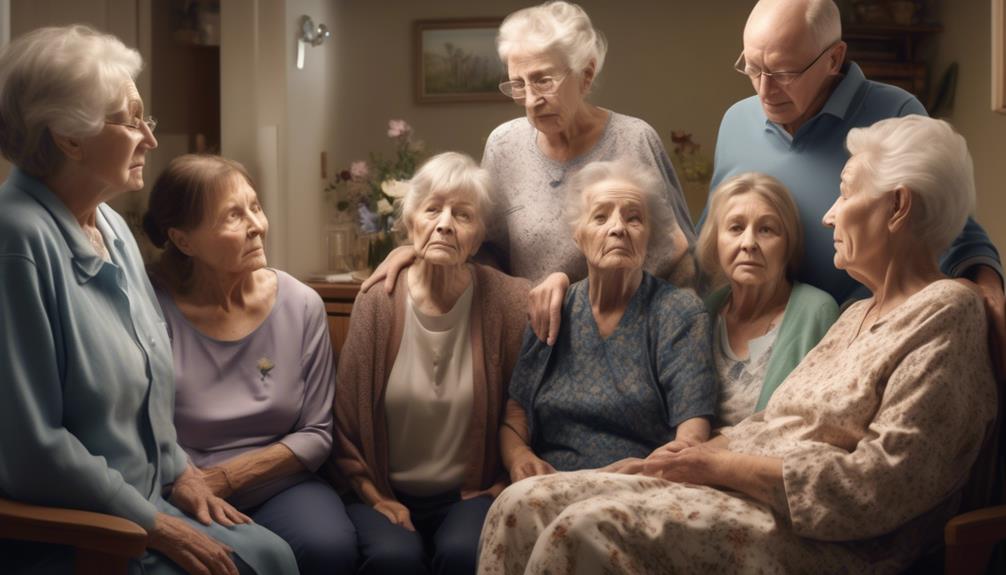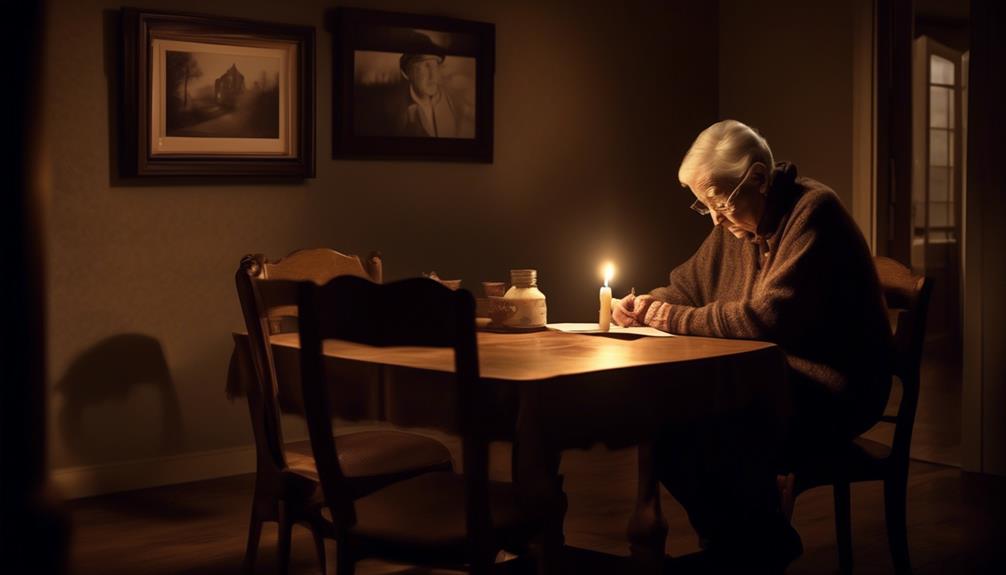Navigating the intricate labyrinth of dementia care involves the challenging task of informing a patient with memory loss about the passing of a loved one, necessitating emotional sensitivity and thoughtful deliberation.
As we navigate the realms of ambiguous loss and grief in these circumstances, we are faced with profound ethical and emotional complexities that necessitate a delicate approach.
The impact of such a decision extends far beyond the realm of mere information sharing, delving into the core of human connection and compassion, prompting us to ponder the intricate dance between truth, empathy, and the delicate nuances of the human experience.
Key Takeaways
- Validate emotions behind questions
- Engage in memory-stimulating activities
- Provide compassionate support and empathy
- Establish a strong support network
Understanding Dementia Progression and Emotional State
Navigating through the complexities of dementia progression and the emotional rollercoaster it brings can be a challenging journey for both patients and their loved ones. As dementia advances, individuals experience an ambiguous loss of their former self. The person they once were starts to fade, leading to feelings of grief and confusion not just for the patient but also for their family and caregivers.
Dementia affects memory, reasoning, and communication, making it hard for the person to express their emotions clearly. Understanding the emotional state of a dementia patient is crucial in providing the right support. Alzheimer's disease, a common form of dementia, can profoundly impact daily life and independence, intensifying feelings of loss and grief.
Family members and caregivers play a vital role in offering support and navigating these challenging emotions. It's essential to acknowledge the grief experienced by both the person with dementia and those caring for them. Tailoring support based on the individual's stage of dementia and emotional state is key to effective communication and providing comfort during this difficult time.
Supporting Grieving Process With Compassion

Understanding and providing compassionate support for the grieving process is essential when caring for a dementia patient navigating the loss of their spouse. By offering emotional support through physical contact, verbal reassurances, and active listening, we can comfort the individual during this challenging time. Changes in mood, appetite, sleep patterns, and activity levels may indicate grief in dementia patients who have experienced the loss of their spouse. Creating a safe environment, seeking professional help, and maintaining routines are crucial steps in supporting the grieving process. Engaging in memory-stimulating activities and addressing repetitive questions with empathy can aid the individual in coping with the news of their spouse's death. Building a strong support network involving family, friends, and professionals is essential for a dementia patient to navigate the ambiguous loss and cope with their grief effectively.
| Key Support Strategies | Description |
|---|---|
| Emotional Support | Provide comfort through physical touch, reassurance, and attentive listening. |
| Memory-Stimulating Activities | Engage in activities that stimulate memory and cognitive functioning to support the grieving process. |
| Professional Help | Seek assistance from healthcare professionals to ensure the individual receives appropriate support and care. |
Addressing Repetitive Questions and Memory Challenges
How can we best address the repetitive questions and memory challenges faced by dementia patients grieving the loss of their spouse? It's crucial to approach these situations with empathy, understanding the complexities of memory loss in dementia patients dealing with grief.
Here are some ways to navigate this challenging terrain:
- Validate Emotions: Acknowledge the emotions behind the repetitive questions, offering reassurance and comfort to the individual.
- Repetition with Patience: Respond to the same questions with patience and kindness, recognizing that short-term memory loss may contribute to the need for constant reassurance.
- Memory-Stimulating Activities: Engage in activities that stimulate memory, such as looking at photo albums or listening to familiar music, to support memory recall and emotional connection.
- Empathetic Responses: Respond with empathy and understanding, creating a safe space for the individual to express their emotions and feel supported throughout their grieving process.
Involving Family and Friends in the Grieving Process

Engaging family and friends in the grieving process of dementia patients is a crucial step towards providing emotional support and practical assistance during this challenging time. Grief and loss can be overwhelming for both the individual with dementia and their caregivers, making the presence of a supportive network invaluable.
Involving loved ones helps create a nurturing environment where everyone involved feels connected and understood. Support groups can offer guidance, companionship, and aid in navigating the complexities of grief in dementia caregiving.
Building a strong support network through consistent involvement from family and friends is essential for coping with the ambiguous loss experienced in dementia. Caregiver support is vital in providing emotional support and practical assistance, ultimately aiding in the coordination of care and strengthening relationships.
Seeking Professional Help and Support Groups
Navigating the complexities of grief and ambiguous loss in dementia caregiving can be facilitated by seeking professional help and engaging in support groups that offer emotional support and valuable resources. When facing these challenges, caregivers can benefit greatly from the following:
- Seeking Professional Help: Grief counseling sessions can provide emotional support, guidance in developing coping strategies, and aid in processing emotions related to ambiguous loss.
- Joining Support Groups: Caregiver support groups offer practical advice, valuable resources, and a sense of community, helping individuals cope with the challenges of dementia caregiving and grief.
- Connecting with Healthcare Professionals: Healthcare professionals can offer emotional support, practical advice, and connect caregivers with relevant resources to navigate ambiguous loss effectively.
- Accessing Resources: Utilizing recommended resources, courses, and guidebooks can equip caregivers with the necessary information and tools to provide optimal care for their loved ones and navigate ambiguous loss successfully.
Frequently Asked Questions
Should You Tell a Dementia Patient Their Spouse Has Died?
We believe that deciding whether to inform a dementia patient about their spouse's death requires careful consideration. It's crucial to assess the patient's emotional state, cognitive abilities, and potential well-being impact before sharing such news.
Tailoring the approach to the individual's needs and emotional resilience is essential. Using therapeutic fibs or redirection techniques may help prevent unnecessary distress.
Ultimately, the decision should prioritize the patient's best interests and emotional stability.
What Are 3 Things to Never Do With Your Loved One With Dementia?
When caring for a loved one with dementia, it's crucial to remember not to argue or correct them, as it can cause distress. Avoid using complex language or overwhelming them with too many questions.
Rushing or hurrying can lead to agitation, so it's best to take things slowly. Criticizing repetitive behaviors or showing impatience isn't helpful; it's better to provide patience and understanding.
Meeting emotional needs and validating feelings is essential for their well-being.
Should Grief Be Private?
Absolutely, grief can be a deeply personal journey that deserves privacy. It allows individuals to process emotions in their own time and manner. Respecting this privacy enables dignity and personal coping mechanisms.
While support is crucial, the choice to share one's grief should ultimately rest with the individual. Encouraging open communication and understanding can foster a safe space for grieving.
Why Is Grief Not Talked About?
Grief often remains unspoken due to societal discomfort with discussing loss openly. Cultural taboos and beliefs can contribute to this silence. Stigma, fear of vulnerability, and lack of understanding may hinder conversations about grief.
People sometimes avoid discussing grief due to personal discomfort, fear of saying the wrong thing, or uncertainty about offering support. Inadequate education and misconceptions can lead to avoidance of the topic altogether.
Conclusion
In conclusion, when faced with the delicate decision of whether to tell a dementia patient their spouse has passed, we must remember that honesty isn't always the best policy. Sometimes, a little white lie can protect their fragile emotional state.
As we navigate the complexities of grief and loss in dementia patients, let's approach with sensitivity, compassion, and a touch of strategic deception. After all, sometimes a little fib can go a long way in preserving their peace of mind.









